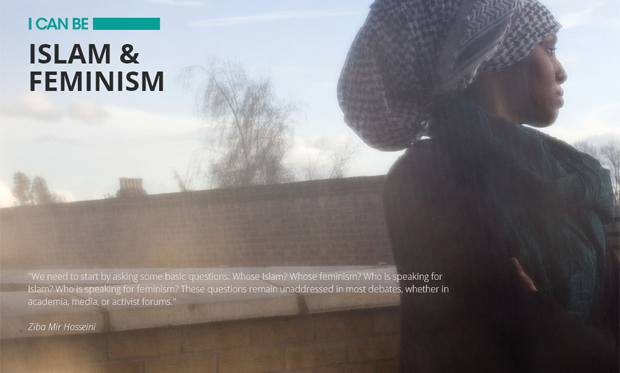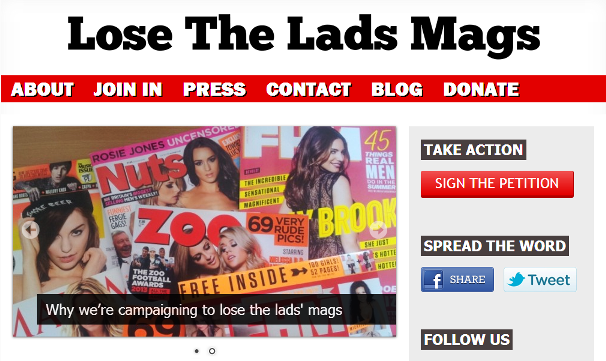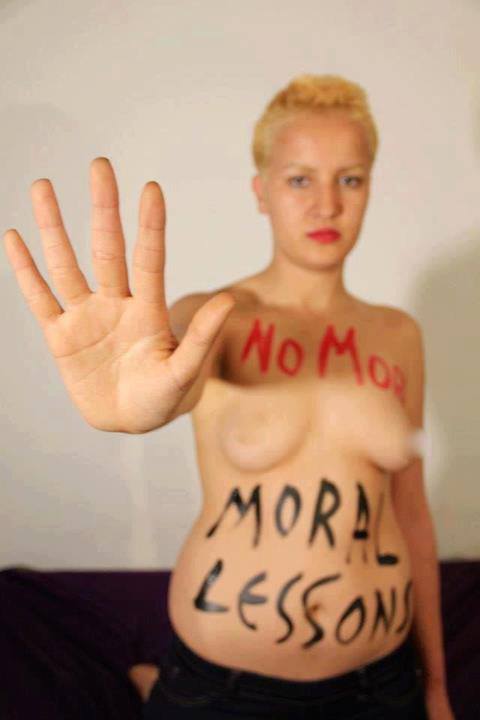25 Mar 2014 | News, Religion and Culture, Young Writers / Artists Programme

This month, British charity Maslaha launched the website “Islam and Feminism”– a new project which aims to unite the two belief systems. “Muslim women have the same core concerns as white, secular, British women: the workplace, discrimination [and] childcare” says the charity’s Latifa Akay, yet they have long been excluded from the feminist debate. This is what the project wants to change by promoting the idea that women of all religions can push for gender equality.
Inna Shevchenko, leader of topless protest group Femen, strongly disagrees. “I will never have a discussion about Muslim feminism because it doesn’t exist. It cannot exist. It’s oxymoronic.” Femen’s intolerance has seen them labelled as “white colonials” and “cultural imperialists” but the group’s real fault is the way it forces women into a mould, leaving no space for individualism.
In 2012, Femen protested against the International Olympic Committee’s collaboration with Islamist regimes. As a demonstrator was led away by police, she screamed “I fight for women who are not free. We are not free”. She had elected herself as spokesperson for women around the globe but the way she spoke for Muslims prompted backlash.
It seemed that many Muslim women did not want to be “liberated” by semi-nude activists. They felt Femen were patronizing and had done little research into the culture of Islam. The Facebook page “Muslim Women Against Femen” was founded and a series of selfies, emblazoned with slogans appeared – “hijab is my right”, “nudity does not liberate me” and “I do not need saving”. A feeling of resentment was prominent; these women did not want western ideals imposed on their faith.
Artist Sarah Maple considers this idea in her current exhibition, “God is a feminist”. Her work turns the tables on common perceptions of Muslim women as trapped and victimized. “In the West there is an obsession with being sexually attractive in a very limited and narrow way. I was looking at how this may be seen as a form of oppression and that there may be a freedom in covering up”.
Feminism should never be rooted in the idea of whitewashing society. Surely nothing is more backward than the mind-set; “to be free, you must look like me, think like me and live like me”. Equality is about giving all genders absolute choice, no matter their religion.
Recently it has become a trend for far right groups to hijack feminist rhetoric – alienating Muslims from feminist dialogue. During an anti-Islam rally in Munich, The Freedom Party’s Michael Stürzenberger furiously revealed to the crowd that Sharia instructs men to hit women. “We don’t want that in Bavaria!” he bellowed. Yet he is not concerned with women’s rights, instead he channels his efforts into spreading Islamophobia. He’s already lead over 100 anti-Islam demonstrations.
British groups like the English Defence League and the British National Party also rush to condemn Islam’s lack of feminist values. But their opinions in this area seem entirely self-serving, especially when they are associated with candidates like the BNP’s Nick Eriksen.
Feminism must separate itself from inflammatory politics. Instead, its focus should be on educating women and empowering them to make their own choices – making sure no one is trapped in any lifestyle. However freedom and tolerance should always be on the same side.
Feminism should mean that women can work in any industry, receive the same pay as their male colleagues and demand respect from their husbands, whether they wear the hijab or not. Of course Muslims can be feminist and their views should be welcomed into the debate.
This article was posted on March 25, 2014 at indexoncensorship.org
29 Jul 2013 | News, Politics and Society, United Kingdom
The Co-operative chain has told magazines such as Nuts and Zoo to clean up their act. Will women really benefit?
 The “Lose the Lads Mags” campaign claims to want freedom: freedom for supermarket employees against exposure to pornography at work, and for women against sexual objectification, which the campaigners claim encourages gendered violence. But by threatening to prosecute retailers under the Equality Act if they continue to stock the magazines, they are endorsing a kind of illiberal censorship that curtails free speech, press freedom, consumer choice, and, in a climate of incipient creeping fig-leafing, sexual expression itself.
The “Lose the Lads Mags” campaign claims to want freedom: freedom for supermarket employees against exposure to pornography at work, and for women against sexual objectification, which the campaigners claim encourages gendered violence. But by threatening to prosecute retailers under the Equality Act if they continue to stock the magazines, they are endorsing a kind of illiberal censorship that curtails free speech, press freedom, consumer choice, and, in a climate of incipient creeping fig-leafing, sexual expression itself.
It is hard to see just how curbing the sale of lads mags would tackle the endemic root of the coalition’s ire – female objectification, a phenomena that predates the publication of Nuts, Zoo et al by several thousand years. Yet the Lose the Lads mags campaigners claim that, in normalising sexual objectification, the magazines encourage violence against women, and vaguely states that there is ‘research’ (although it is not cited) to prove it.
One such source of research is Dr Peter Hegarty, Psychologist at Sussex university, who took part in a radio debate with me on the topic. Hegarty was a co-researcher in a 2011 study which found that participants presented with descriptions of women taken from lads’ mags, and comments about women made by convicted rapists could not distinguish the source of the quotes.
On this basis, Hegarty suggested, it is the tone of lads mags that it is the issue not the images themselves. Banning them on the basis that the cover content constitutes sexual harassment, as the Lose the lads Mags campaigners want to do, misses the scientific point and only further discredits their agenda..
What’s more, if lads magazines are ripe for prosecution then so, surely, are the tabloids and their daily diet of bikined and knicker-flashing celebs, also sold in mainstream supermarkets – particularly given the way they are displayed at prime eye-level position in their freestanding carousels in many outlets.
There could be ramifications for press freedom. If the Equality Act can be invoked by employees who feel sexually harassed by images of scantily clad women, could ethnic minority employees can sue supermarkets for forcing them to handle the Daily Mail on the basis that it publishes offensive attitudes towards immigrants, for example?
As fears about internet pornography and the sexualisation of children grow in the West, so come the protectionist and prohibitionist attempts to clamp down on sexual representation. Earlier this year, the EU Women’s Rights and Gender Equality Committee voted on a clause calling for the banning of all pornography in the media. The vote was split, but the censorious attitudes remain. Now that many liberal feminists have joined ranks with their radical cohorts, and the conservative right against sexual representation, a minority of those of us who believe sexual expression doesn’t have to be dehumanising or derogatory are left to defend sexual freedom for everyone.
What we need isn’t fewer lads mags, but a more diverse representation of sexuality, both male and female, and better education about the material already out there. When we consider that 42 per cent of 10 to 17 year olds have viewed internet porn in the last year, and have access to it in their own homes, on their smartphones and tablet devices, lads mags are surely an easy – and misplaced – target. Helping boys and young men to understand the difference between imagery and reality in relation to sex and women and so make informed, considered choices about the material they then consumed and their reaction to it is surely the sensible, sustainable answer.
When it comes to sexual representation, out of sight out of mind certainly doesn’t help. And no positive sexual revolution ever achieved change by cloaking what it feared.
@NichiHodgson
Nichi Hodgson is a journalist and broadcaster. Her latest book is Bound To You
nichihodgson.com
21 May 2013 | Middle East and North Africa

Tunisian activist Amina Tyler was arrested on Sunday (19 May), after allegedly attempting to stage a topless protest in the central Tunisian city of Kairouan.
Tyler, who heads Tunisia’s branch of feminist movement FEMEN, first faced controversy in March, after posting topless photographs online. Ukranian feminist group FEMEN is notorious for its brand of bare-chested protest.
Hardline Salafi group Ansar al-Sharia was set to hold their annual congress in Kairouan on Sunday, but authorities banned the gathering. Tyler passed through the heavily guarded checkpoints around the city, set up to enforce the ban on the Salafi gathering. Salafis in the city clashed with security forces shortly before Tyler’s arrest.
The activist reportedly painted the word “FEMEN” as well as anti-salafist slogans on a cemetery wall near al-Okba mosque, one of Tunisia’s most important and historic religious sites. Collective blog Nawaat released a video of Tyler’s arrest — which occurred shortly after she was surrounded by local residents yelling for her to leave. Local police said that residents became enraged once Tyler attempted to take off her clothes.
A spokesman for Tunisia’s Ministry of Interior on Monday called Tyler’s protest “an act of provocation”, and “against the morals and traditions of Tunisian society, which is a Muslim society.” Tyler has not yet been charged, but she will appear in court today. Public indecency is punishable under Tunisian law, and if charged Tyler could face up to six months in jail.
Sara Yasin is an Editorial Assistant at Index. She tweets from @missyasin
23 Feb 2012 | Russia
Pussy Riot is a feminist punk collective from Moscow. They hide their faces under coloured balaclavas, use nicknames to remain anonymous and perform unsanctioned concerts in peculiar places. Since their emergence last autumn Pussy Riot have performed in underground stations, in shops and on trolleybuses and detention centres’ roofs.
Pussy Riot came to the attention of Russia’s anti-extremist police. In late January they performed an anti-Putin song in the Red Square right in front of Kremlin. The performers were arrested and had to spend several hours in a police cell.
But this week’s “concert” brought them real public attention after they performed what they called a punk prayer “Mother of God, send Putin away” in Moscow’s biggest Orthodox Cathedral. It is the Cathedral high-ranking officials usually attend on the biggest Orthodox holidays. The leader of the Orthodox Church, Patriarch Kirill, is a Putin supporter.
The band got into the cathedral just like regular parishioners, but then started dancing and shouting out anti-Putin words:
KGB head is the biggest saint, who leads protesters to pre-trial prisons … The Patriarch believes in Putin. He should rather believe in God … Mother of God, become a feminist… Send Putin away
The group managed to evade the cathedral’s security, and no one was arrested. Even if one of them did get arrested, she would be quickly replaced, the women explained to journalists. Pussy Riot has no leaders or permanent participants — they are just an anonymous group of punk feminists fighting authoritarianism.


 The “
The “